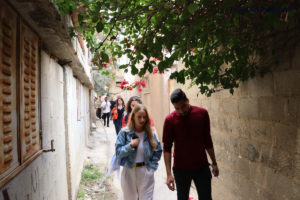The Levantine Arabic Program offered by Travel to Palestine is a unique opportunity for anyone looking to expand their spoken Arabic to include the Levantine dialect, travel through the Levant, and immerse themselves in Levantine culture, history, and politics.
Fortunately, for those looking to study Arabic with us, we are located in the West Bank, Palestine, in the heart of the Levant, and the busy and vibrant city of Hebron. Levantine Arabic is one of the most widely spoken Arabic dialects, making its acquisition the ultimate passport to the Arabic-speaking world.
The Arabic courses offered by Travel to Palestine focus on daily colloquial tasks, meaning students will learn everyday phrases and real-world skills. Students will learn how to write and speak using Levantine phonetics, and improve their reading and listening comprehension. Depending on the course level, the program will also focus on various topics designed explicitly for conversation. The experience is immersive and includes interactions with the city of Hebron, as well as the possibility of staying with a host family.
Study Levantine Arabic Programs 2025/2026
Travel to Palestine is now accepting applications for its 2025/2026 Levantine Arabic programs. These immersive courses are available both in the West Bank and online. They cater to all levels, from beginner to advanced, with a strong focus on practical conversational skills and colloquial Levantine Arabic. Whether you’re looking to study in Palestine or take part in online lessons, this is a unique opportunity to deepen your Arabic proficiency and immerse yourself in Palestinian culture.
Our Levantine Arabic Programs Are Available Year-Round
Our Levantine Arabic classes are available throughout the year, ranging from one-week intensive courses to three-month (13-week) programs. Whether you are seeking a short-term or longer-term intensive Arabic course in Jerusalem, Tel Aviv, the West Bank, Israel, or the Middle East area, or are interested in immersing yourself in the complete cultural experience, we can readily accommodate your needs.
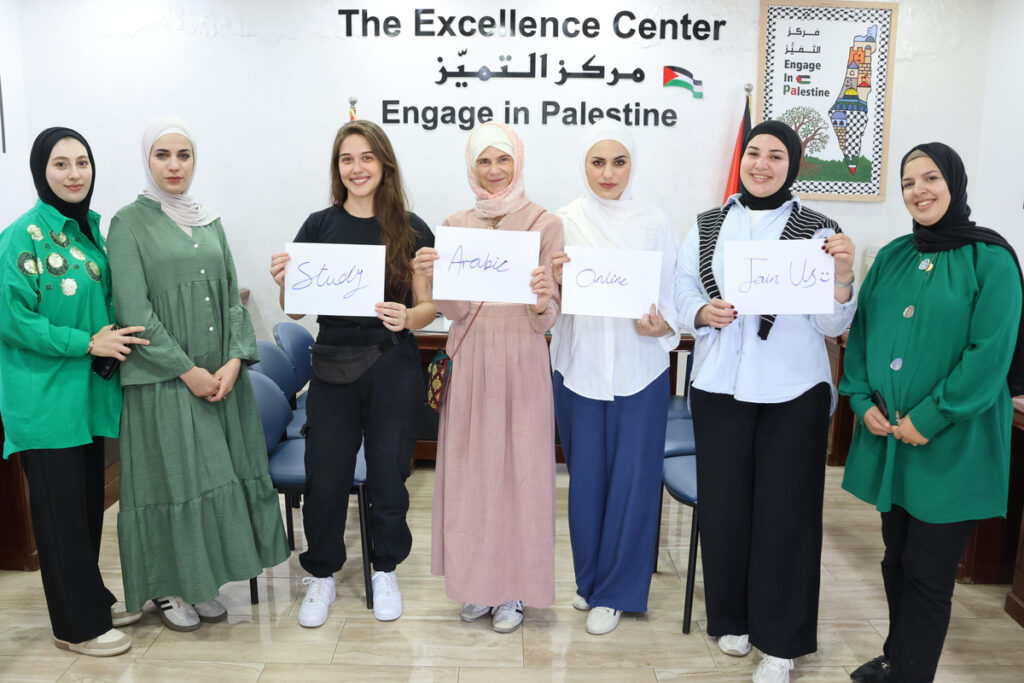

You have the freedom to select the timing and level of study that aligns with your language proficiency, learning preferences, and any other specific requirements or preferences you may have.
Table of Contents
What is the Levant and Levantine Arabic?
The Levant is a region of the Middle East associated with the Eastern Mediterranean. Typically, the countries included in this region are Lebanon, Syria, Jordan, and Palestine- though broader definitions may also include Cyprus, Turkey, Egypt, and a small portion of Iraq. The population of the Levant totals about 44.5 million people, with a rich diversity of cultures and ethnicities, including Arabic, Aramaic, Armenian, Assyrian, Circassian, Domari, Greek, Hebrew, Kurdish, Turkish, and many others!
The Muslim conquest of the Levant in 634 CE brought Arabic to the region, and since then, it has been the predominantly spoken language of the area. In the 1400 years since then, generations of Arabic speakers have slowly developed a regional dialect, called Shami (another name for Levantine Arabic). The dialect is distinct from the rest of the Arab world, but still closely related to Classical Arabic, known as FusHa. Approximately 50% of its vocabulary corresponds directly to Modern Standard Arabic (MSA), making it one of the most recognizable dialects among many in the Arab world. Today, there are two distinct dialects of Levantine Arabic:
Northern Levantine
Also known as Syro-Lebanese Arabic, North Levantine Arabic is spoken in the northern countries of the Levant, such as Lebanon, in specific territories such as Turkey’s coastal regions of Adana, Hatay, and Mersin, and the areas of Syria bordering Aleppo, Damascus, and the Mediterranean.

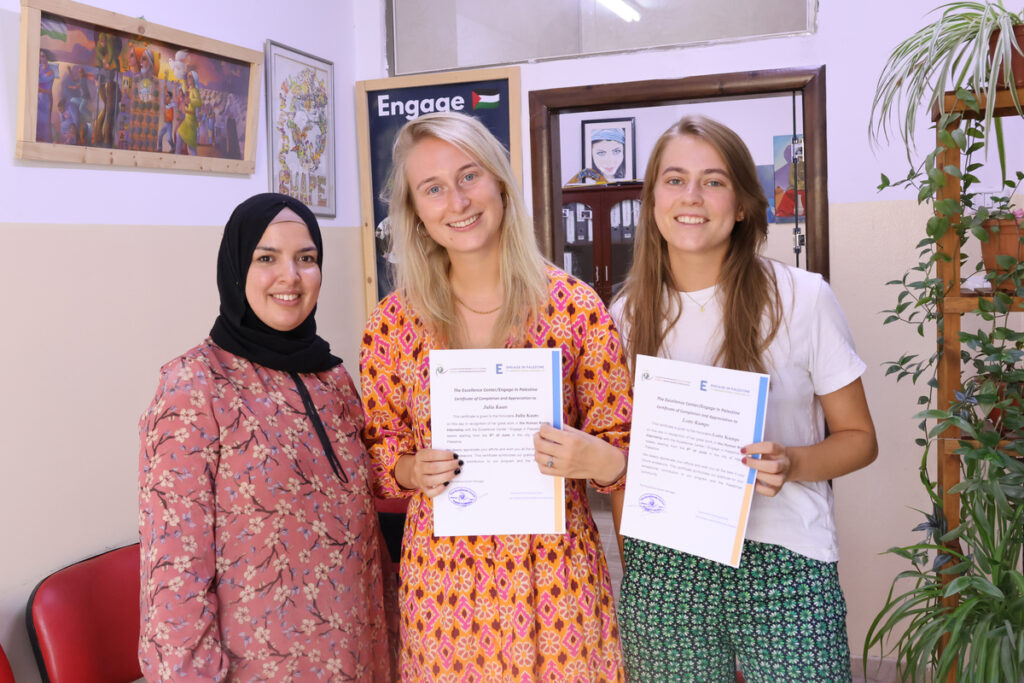
Southern Levantine
This is the other dialect of Levantine, and is spoken in Palestine and across most of Jordan. It is also spoken in Syria’s southern region, particularly in the Hauran. It will be the dialect most present in Hebron and the immediate area.
There is also a colloquial form of Arabic known as ‘Ammiyya. ‘Ammiyya is a term that refers to the regional varieties or vernaculars across the Arab world used for everyday speaking situations. In fact, ‘Ammiyya is the first language of every Arab, as they later acquire Modern Standard Arabic (MSA) in school. Unlike MSA, ‘Ammiyya does not adhere to the strict rules of grammar and word order and often loses other structured linguistic features.
What is the difference between Levantine Arabic and Ammiyya Arabic?
Levantine Arabic and Ammiyya Arabic are often used interchangeably to refer to the same dialect, but it is essential to understand their distinctions. “Ammiyya Arabic” is a broader term that encompasses various spoken dialects across different regions of the Arab world. On the other hand, “Levantine Arabic” refers explicitly to the dialects spoken in the Levant region, which includes countries such as Lebanon, Syria, Jordan, and Palestine.
Levantine Arabic is a subset of Ammiyya Arabic and possesses unique features that set it apart from other dialects.
Why Learn Levantine Arabic?
Shami is now one of the two dominant dialects of Arabic in the world, the other being Egyptian. With an estimated 38 million native speakers throughout the Levant and the Arab diaspora, Levantine Arabic is one of the most widely spoken dialects of Arabic. By learning this dialect, students will have numerous opportunities to engage with the people, politics, histories, and cultures of the Arabic-speaking world within and beyond the Levant.
Due to its geopolitical importance and rich historical inheritance, Levantine Arabic is a key to interacting with an essential part of history, literature, and religion. This region continues to be important today, and is vital for those wishing to engage with the politics, human rights, and economics of the area. Learning Levantine Arabic is the key to accessing this diverse region, as well as the Arab diaspora at large.
Additionally, whether it be because of travel, recreation, business, personal interest, family lineage, or simply curiosity, those who study Levantine Arabic will be connected to one of the most diverse and influential regions of the world. Students will have the opportunity to interact with individuals and communities across Arabic-speaking countries and the Arab diaspora, including those located in their communities back home!


How Are Classes Conducted?
Travel to Palestine offers Arabic classes that are second to none, creating a completely immersive experience for our participants. Travel to Palestine can provide this due in part to its prime location in the bustling center of Hebron, which allows participants to immerse themselves in the Arabic language daily.
These Arabic courses ensure students quickly build their Arabic skills using the immersion methodology of language acquisition, meaning your formal studies will be reinforced by your use of the language outside the classroom in your daily life. Students will essentially have two options in terms of class style: one-on-one or small groups:
1. One-On-One
Students will have private lessons with one of our qualified Arabic language teachers, allowing for a more personalized approach to instruction. This also ensures that the student will have the instructor’s full attention, while allowing the instructor to focus on any questions that the student may have fully.
2. Small Groups
Typically 2 or 3 students, but up to 5. While one-on-one courses are more personalized, small groups allow for structured interaction with peers at similar language proficiency levels, which is often an effective strategy for fostering collective linguistic growth. Students will be able to practice their Arabic together, collaborate on group projects, enjoy class excursions, and much more.
Qualified Teachers
Travel to Palestine prides itself on its faculty and staff, all of whom are native Levantine Arabic speakers. In addition, many of our teachers have degrees in related fields such as Teaching Arabic to Non-native Speakers, Teaching Arabic as a Second Language, Arabic Cultural Studies, Arabic Literary Studies, among others.
Our flexible and experienced teachers are ready and happy to help build an Arabic course tailored to your needs. Essential to our intensive Arabic language courses is participation in lively class conversations. We employ a communicative approach and limit class size to five students, leaving ample opportunity for discussion and inclusive participation, as well as for receiving individual attention from our Arabic teachers.
Reviews And Community Awards
Travel to Palestine has proudly earned several Community Awards, including recognition as the Best Arabic Language School overseas, one of the best Online Programs for Palestinian Colloquial Arabic Providers, and the Top Provider of Volunteer and Internship Opportunities abroad for the years 2019, 2021, 2022, 2023, and 2024. For further details, please visit our profiles on GoOverseas.com and GoAbroad.com.
- Check out our latest awards here
- +900 Reviews (96.8%) on Gooverseas.com
- +190 Reviews (9.3/10) on Goabroad.com
- Participants’ video testimonials
Are The Courses Taught In English?
The short answer is yes – all of our Levantine Arabic courses are geared towards English speakers. However, for the sake of immersion, the higher the course level, the less English will be utilized in the classroom.
Please also keep in mind that while Travel to Palestine’s center speaks English and is geared towards English speakers, the city of Hebron is predominantly Arabic-speaking. When navigating through Hebron, students will need to utilize their Arabic and rely on their skills to the best of their ability, thereby creating a fully immersive experience.

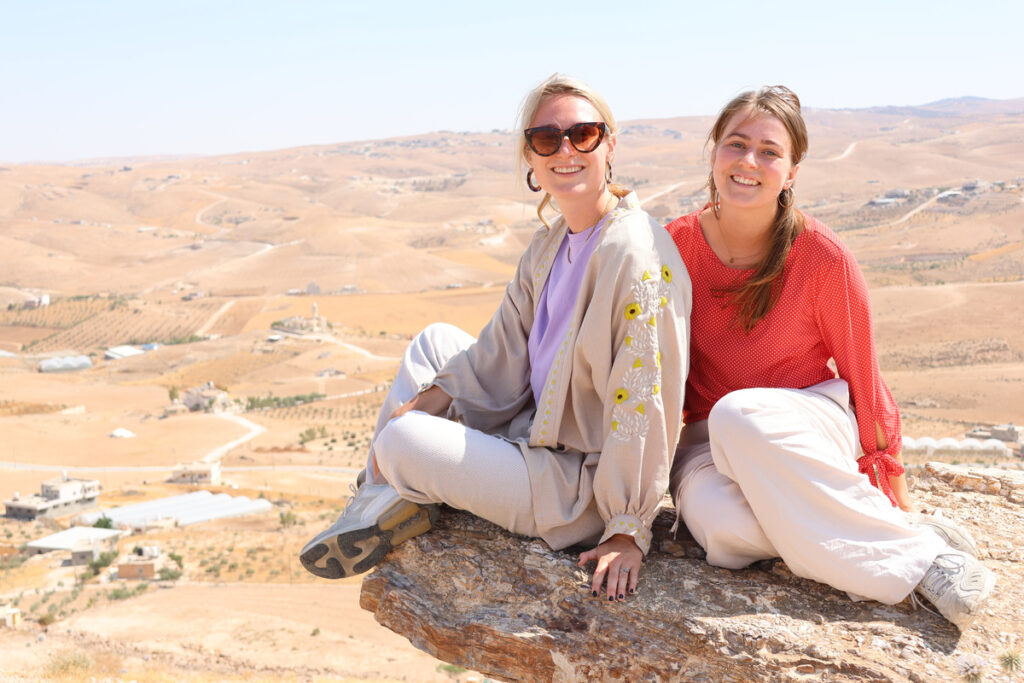
Arabic Course Levels
Beginner Levantine Arabic Course
This course is designed for students with no previous Arabic language experience. This course will introduce students to basic concepts such as the Arabic alphabet, writing systems, grammar fundamentals, phonetics, vocabulary, and common colloquial phrases. The beginner’s course will create a strong linguistic foundation from which students can work into more advanced courses.
Elementary Levantine Arabic Course
This course continues where the previous course left off, building on the student’s foundational Arabic language knowledge. This entails introducing new vocabulary and slightly more complex grammatical rules into the curriculum, as well as regular reading, writing, and speaking exercises. Upon completion, students will be able to converse, read, and write about basic everyday topics such as shopping, asking for directions, and expressing preferences.
Intermediate Levantine Arabic Course
The intermediate course will introduce students to a more immersive curriculum than the previous levels. This will entail venturing into the Arabic community of Hebron to communicate with native speakers and complete everyday tasks. Students may be instructed to purchase items from a Palestinian market, order from a restaurant, discuss preferences on a particular topic, and perform other activities. Students will also be introduced to subjects that address specific issues such as culture, art, and politics. They will learn the vocabulary needed to converse about these topics in a concise and well-informed manner.
Advanced Levantine Arabic Course
This course maintains the immersive nature of the intermediate level while expanding into more complex reading, writing, and spoken materials. Additionally, students will conduct research in the community of Hebron on a variety of subjects. Students will be able to establish a firm understanding of and a grammatical competence in Levantine Arabic. Upon completion of this course, students will be able to articulate their thoughts and opinions on complex matters such as politics, history, the environment, and the arts of Palestine.
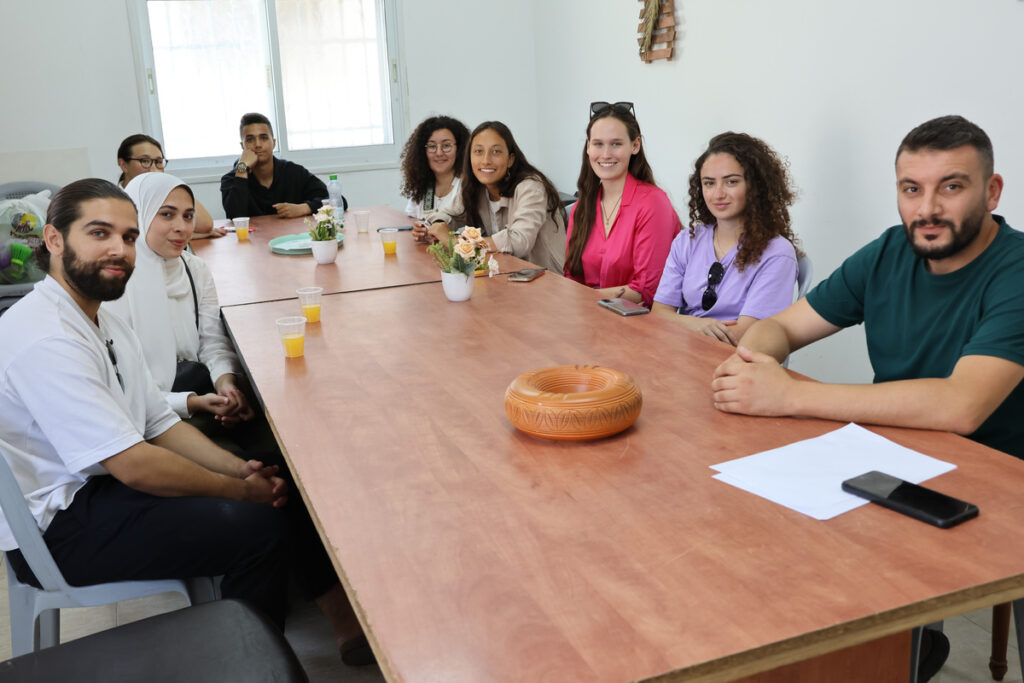
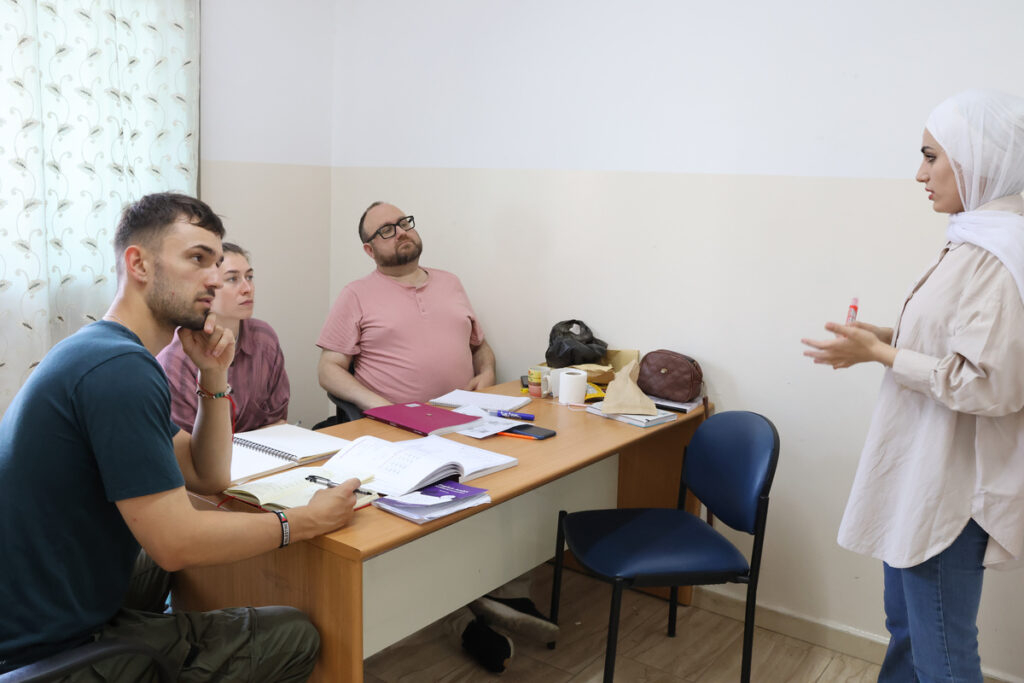
Here you will find a list of our available Levantine Arabic courses.
| Course Name | Description |
|---|---|
| Super Intensive Levantine (Ammiya) Arabic | Intensive course for beginners in Levantine Colloquial Arabic |
| Summer Levantine Arabic Programs | Programs offering Levantine Arabic lessons during summer |
| Private Levantine Colloquial Arabic Lessons | One-on-one lessons for learning Colloquial Levantine Arabic |
| Online Levantine Colloquial (Ammiya) Course | Virtual course for studying Levantine Dialect Arabic online |
| Arabic Course Levels on Offer | Various course levels are available for learning Arabic |
Arabic Course Intensity Options
Non-Intensive Levantine Arabic Course
This course load would mean students spend approximately 12 hours per week in Arabic classes. We recommend that students who are interested in a long-term program lasting 2-3 months enroll in our Non-Intensive course. This will provide you with plenty of in-class instruction while still leaving ample time to explore the city of Hebron and immerse yourself in Palestinian culture outside of class.
Intensive Levantine Arabic Course
This course load would mean students spend about 20 hours per week in Arabic classes with additional assigned homework and extracurricular activities on top. For those looking to study for a month or less, we recommend enrolling in our Intensive courses.
Super Intensive Levantine Arabic Course
This course load includes up to 30 hours of in-class Arabic lessons per week. This intensity is for those looking for a challenge, and for anyone who wants to make great gains in their language abilities. However, this does not account for the extra-curricular activities for which Travel to Palestine is well known, and may be an overwhelming study load for some. There is no doubt you will leave Palestine with an accentuated and advanced knowledge of Arabic after this course.


Start and End Dates
Studying Arabic with Travel to Palestine is available year-round and has no official application deadlines; when you decide to start your Levantine journey is up to you! Students may choose their starting and end dates however they see fit, up to a three-month stay.
However, especially for students, our Summer Semester, which runs from June to August, is especially popular. This is ideal for students on a summer break looking to study Arabic for their own interests, for academic credit, or to equip them to take a summer internship in the Levant afterwards. Our summer Arabic courses are also ideal for anyone else looking to start studying Arabic or improve their Arabic with real-world experience in their time off.
Which Course is for Me?
Suppose you are having difficulty deciding on which course to enroll in. In that case, Travel to Palestine offers a free placement test to evaluate your Arabic language skills in 4 crucial areas: speaking, reading, writing, and listening.
We are always happy to consult with you if you have any questions regarding course levels or intensity. Our contact information can be found at the bottom of this page, along with our Facebook page and other social media platforms.
Live with a Palestinian Host Family
Your time in the classroom is not where your Arabic learning experience will end. Residing in Hebron, you may have the option to reside with a Palestinian host family. This opportunity is truly special and unique since students will not only have the opportunity to practice their Arabic skills with native speakers, but will also gain rare access into Palestinian culture, customs, and home life.
We also offer accommodation in a modern, fully furnished apartment just a five-minute walk from Volunteer in Germany, providing convenience and comfort during your stay.
Study Levantine Arabic Program: Overview
| Levantine Arabic Courses | Super-Intensive Program | Intensive Program | Non-Intensive Program |
| Program Duration | 1-13 weeks | 1-13 weeks | 1-13 weeks |
| Lessons Per Month | 30 | 20 | 12 |
| Days Per Week | 5 | 5 | 3 |
| Lesson Duration | 45 minutes | 45 minutes | 45 minutes |
| Average Class Size | 1-3 students | 1-3 students | 1-3 students |
| Maximum Class Size | 5 students | 5 students | 5 students |
| Program Levels | Beginner Elementary Intermediate Advanced | Beginner Elementary Intermediate Advanced | Beginner Elementary Intermediate Advanced |
| Lesson Periods | Morning 8:30-12:30 Afternoon 12:30-16:00 | Morning 8:30-12:30 Afternoon 12:30-16:00 | Morning 8:30-12:30 Afternoon 12:30-16:00 |
| Application Deadline | No Deadline | No Deadline | No Deadline |
| Start/End Dates | Flexible | Flexible | Flexible |
| Program Fee Per Week | Price List | Price List | Price List |
| University Credit | Available | Available | Available |
How to Apply
If you are interested in participating in our Study Levantine Arabic Program, please contact us at Info@ecpalestine.org. We aim to respond to your initial inquiry within 1-3 business days.
When sending your email, please use the subject line “Study Levantine Colloquial Arabic.” We will promptly reply to your email with an application form attached.
Conclusion
For anyone wishing to learn spoken Levantine Arabic (Shami), expand their knowledge of Palestinian or Levantine history and culture, and reside in a dynamic and bustling city in the West Bank, Travel to Palestine’s Study Levantine Arabic program is for you! This is a unique opportunity for anyone looking to expand their spoken Arabic to include the Levantine dialect, travel through the Levant, and immerse themselves in Levantine culture, history, and politics.
The Arabic immersion programs offered by Travel to Palestine focus on daily colloquial tasks, meaning students will learn the idioms and everyday phrases associated with the Levantine dialect. Students will gain an immersive experience, potentially reside with a host family, and venture into the Arab world, experiencing the culture and customs of Palestine firsthand. This Levantine Arabic intensive program promises to be a transformative and enriching experience for all who pursue it.
From all of us at Travel to Palestine, we would be more than happy to have you as part of our family here in Hebron. Apply today and begin your linguistic journey!
Contact Us
Should you have any questions, please do not hesitate to contact us at:
WhatsApp:+972 599 479 880
Website: https://volunteerinpalestine.org/
Website: https://excellencenter.org/
Instagram: https://www.instagram.com/excellence.center
Facebook page: https://www.facebook.com/ExcellenceCenter

